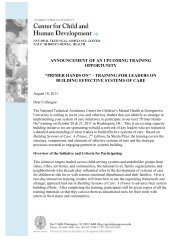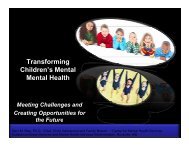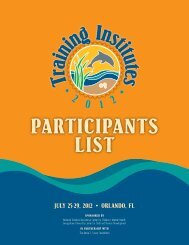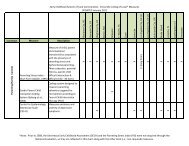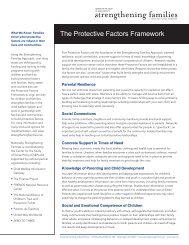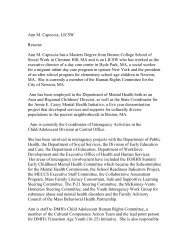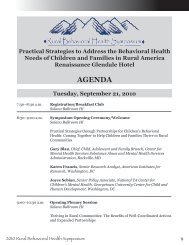Training Institutes 2012 - National Technical Assistance Center for ...
Training Institutes 2012 - National Technical Assistance Center for ...
Training Institutes 2012 - National Technical Assistance Center for ...
Create successful ePaper yourself
Turn your PDF publications into a flip-book with our unique Google optimized e-Paper software.
INSTITUTES<br />
INSTITUTE #28 8:30 AM FRIDAY • 1:30 PM SATURDAY • OSCEOLA 5-6<br />
Cross-System Collaboration to Improve Outcomes: Partnering with Education<br />
OBJECTIVES—Participants will learn:<br />
1. To identify the unique educational needs and challenges of youth involved with the child welfare and/or juvenile<br />
justice systems, including youth in residential and secure care facilities<br />
2. How to implement best-practice strategies <strong>for</strong> addressing both the academic and social-emotional needs of youth<br />
involved with child welfare and/or juvenile justice within the school setting<br />
3. To describe strategies from systems of care and other communities <strong>for</strong> developing, implementing and sustaining strong<br />
collaborations among juvenile justice, child welfare, education, mental health, and other child-serving agencies<br />
4. How to engage in meaningful dialogue through an interactive World Café on strategies <strong>for</strong> achieving better<br />
educational outcomes <strong>for</strong> youth involved with juvenile justice and child welfare in their communities<br />
This Institute will focus on strategies <strong>for</strong> working across child-serving systems to improve educational outcomes <strong>for</strong><br />
youth with mental health challenges. To set the context, faculty will provide an overview of the research in this area,<br />
based on a white paper developed by the <strong>Center</strong> <strong>for</strong> Juvenile Justice Re<strong>for</strong>m at Georgetown University, entitled<br />
Addressing the Unmet Educational Needs of Children and Youth in the Juvenile Justice and Child Welfare Systems.<br />
Faculty will then focus on principles and practices associated with meeting the educational needs of youth in both<br />
systems. The six guiding principles are: quality education services are critical, early education is essential, outcomes<br />
that matter are measured, individually tailored support services <strong>for</strong> youth are provided, interagency communication and<br />
collaboration is vital, and change requires within-agency and cross-agency leadership. Faculty will highlight the<br />
strategies in two practice guides that address the principles of interagency communication and collaboration and<br />
individually tailored support services <strong>for</strong> youth and their families.<br />
Specific topics to be covered include:<br />
• Overview of research on improving educational outcomes <strong>for</strong> youth in the child welfare and juvenile justice systems<br />
• Principles <strong>for</strong> cross-system partnerships to improve educational outcomes <strong>for</strong> youth involved with multiple systems<br />
• Effective strategies <strong>for</strong> cross-system partnerships from the perspectives of the child welfare, juvenile justice,<br />
education, and mental health systems<br />
• Strategies implemented in Hawaii involving interagency collaboration legislation and collaborative strategies across<br />
children’s agencies and how these strategies can foster positive outcomes <strong>for</strong> young people<br />
• Engaging communities in shared initiatives to support one or more of the highlighted strategies<br />
Participants will engage in a World Café activity during which they will explore, through conversation, how they can<br />
effectively remove barriers and build a bridge between education, juvenile justice, child welfare, and mental health in<br />
order to foster educational success <strong>for</strong> youth involved with multiple systems. A World Café poses a question that<br />
invokes meaningful dialogue to allow participants to share knowledge, explore ideas, and discuss ways in which real life<br />
issues can be addressed within their communities. Faculty will include the perspectives of agency staff and<br />
administrator from education, juvenile justice, child welfare, and mental health systems.<br />
MODERATOR/PRESENTER: Simon Gonsoulin, M.Ed., Juvenile Justice Specialist, <strong>Technical</strong> <strong>Assistance</strong> Partnership<br />
<strong>for</strong> Child and Family Mental Health, American <strong>Institutes</strong> <strong>for</strong> Research, Washington, DC<br />
Kelly Stern, State Educational Specialist <strong>for</strong> School Based Behavioral Health, Department of Education, Honolulu, HI<br />
Richard Weisgal, M.A., Child Welfare Specialist, <strong>Technical</strong> <strong>Assistance</strong> Partnership <strong>for</strong> Child and Family Mental Health,<br />
American <strong>Institutes</strong> <strong>for</strong> Research, Walnut Creek, CA<br />
Kelly Wells, M.P.A., Child Welfare Specialist, <strong>Technical</strong> <strong>Assistance</strong> Partnership <strong>for</strong> Child and Family Mental Health,<br />
American <strong>Institutes</strong> <strong>for</strong> Research, Blythewood, SC<br />
60 <strong>Training</strong> <strong>Institutes</strong> <strong>2012</strong>



